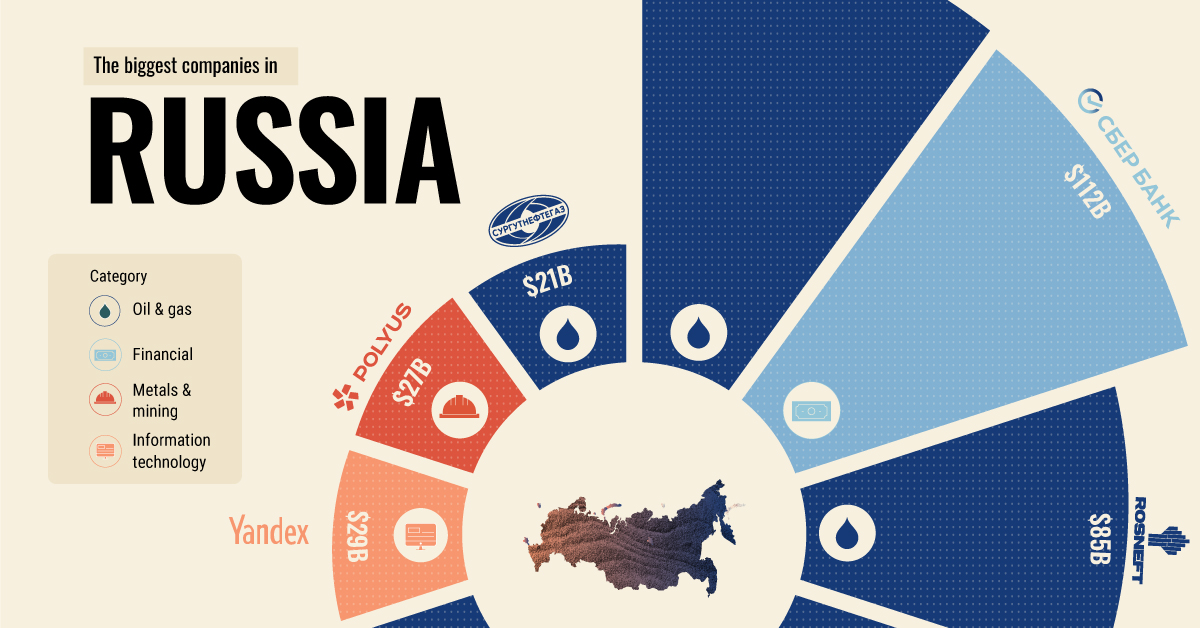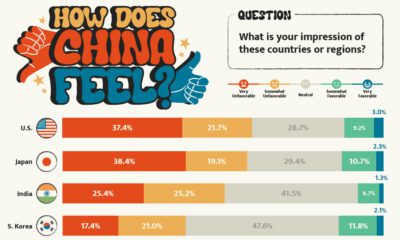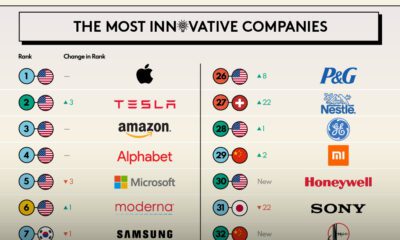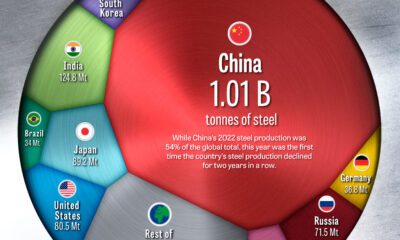Economy
The Top 10 Biggest Companies in Russia
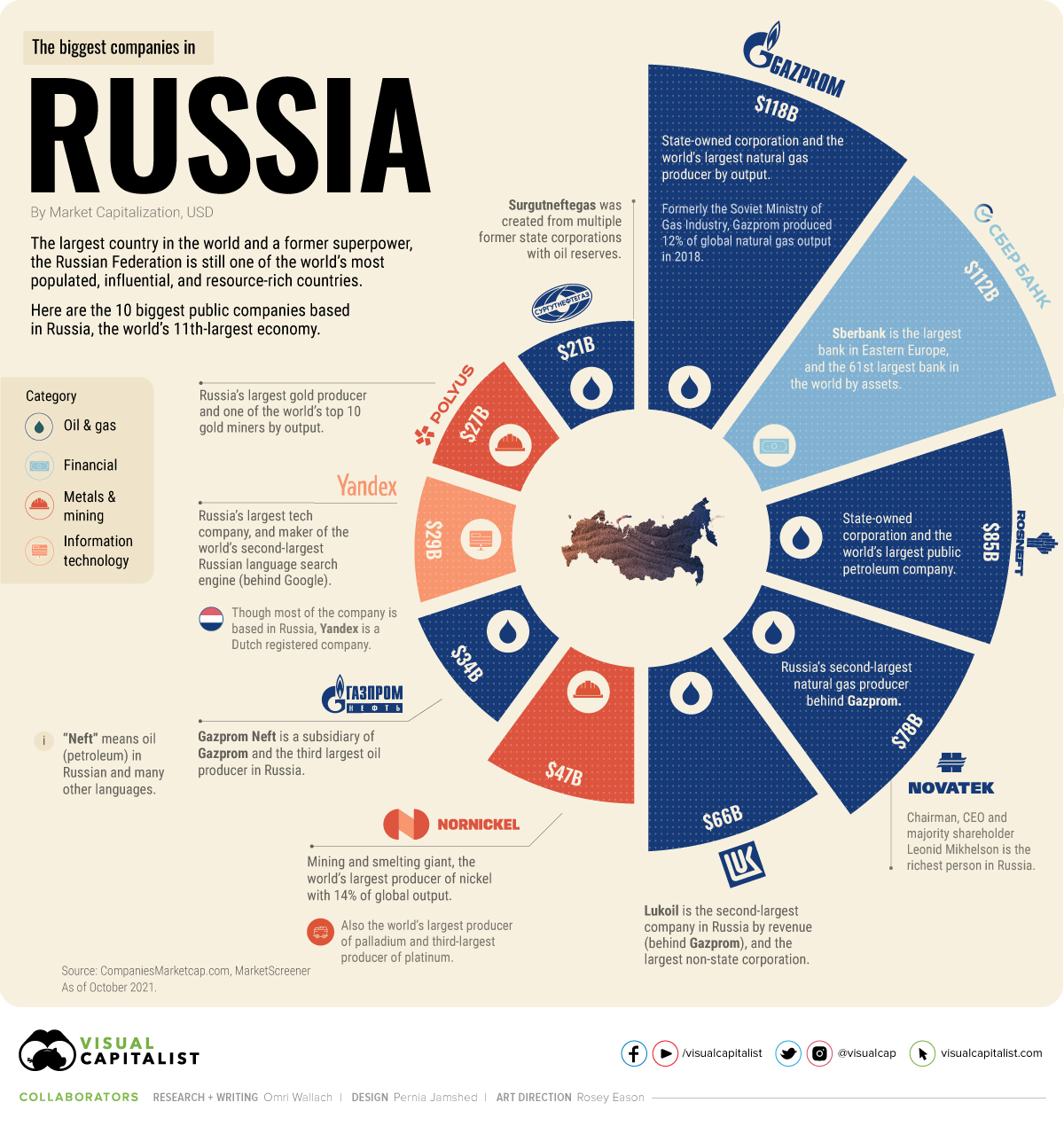
The Top 10 Biggest Companies in Russia
From 1922–1991, the Soviet Union (USSR) was not only the world’s largest country, but also one of its most populated, influential, and powerful.
Today, modern Russia still holds all of those distinctions. Though no longer a designated superpower, the Russian Federation has recovered from the fall of the Soviet Union and has become the world’s 11th-largest economy.
Even after being expelled from the G7 over its annexation of Crimea, Russia’s membership as one of the principal emerging economies in BRICS (alongside Brazil, India, China, and South Africa), the G20, and the United Nations Security Council solidifies its important position in the modern world.
What industries and companies drive the modern Russian state? Here we put the spotlight on the top 10 biggest companies in Russia, using data from Companies Market Cap.
What Are the Biggest Public Companies in Russia?
As a resource-rich country and previously a socialist state, it’s no surprise that many of Russia’s biggest companies are current or former state-owned corporations.
Eight out of the biggest companies in Russia by market value are in natural resources, and four are current state-owned enterprises.
Here are Russia’s biggest public companies by market capitalization in November 2021:
| Top 10 Russian Companies | Category | Market Cap (USD) |
|---|---|---|
| Gazprom | Oil and Gas | $118B |
| Sberbank | Financial | $112B |
| Rosneft | Oil and Gas | $85B |
| Novatek | Oil and Gas | $78B |
| Lukoil | Oil and Gas | $66B |
| Nornickel | Metals & Mining | $47B |
| Gazprom Neft | Oil and Gas | $34B |
| Yandex | Information Technology | $29B |
| Polyus | Metals & Mining | $27B |
| Surgutneftegas | Oil and Gas | $21B |
The two biggest companies in Russia, gas producer Gazprom (formerly the Soviet Ministry of Gas Industry) and banking and financial provider Sberbank, have consistently been the largest enterprises in the country.
In November, Gazprom was bigger with a market cap of $118 billion compared to Sberbank’s $112 billion, though they constantly switch places over time.
But other than Sberbank and tech provider Yandex, the top 10 was composed entirely of oil, gas and mining companies.
Russia’s Importance to Global Natural Resources
Oil and gas specifically made up six out of the 10 biggest companies in Russia. Most like Rosneft, Gazprom Neft, and Lukoil are in oil—the Russian word “neft” means oil or petroleum in Russian and many other languages).
In addition to the two mining companies that cracked the top 10, the biggest companies in Russia highlight the country’s relative importance to global resource sectors. Many of the top 10 companies in Russia are the largest (or amongst the largest) producers of natural resources in the world:
- Gazprom: The largest natural gas company in the world by output, producing 12% of global natural gas output in 2018.
- Rosneft: The world’s largest public oil producer.
- Nornickel: The world’s largest producer of nickel (14% of global output), palladium, and third-largest of platinum.
- Polyus: The world’s third-largest gold producer by output.
- Sberbank: The largest bank in Eastern Europe (and 61st in the world).
Overall, Russia’s vast landscape is estimated to contain over 30% of all natural resources in the world. Factor in a powerful financial sector and the world’s sixth-largest labor force at 70 million strong, and it’s clear to see why the country’s influence is so widespread.
As global powers begin to pledge greater commitment to clean energy, however, Russian companies also find themselves navigating transitional demand and pledging support for green projects.
What other companies or industries do you associate with Russia?
Politics
How Do Chinese Citizens Feel About Other Countries?
What is the Chinese public’s view of world powers? This visual breaks down Chinese sentiment towards other countries.
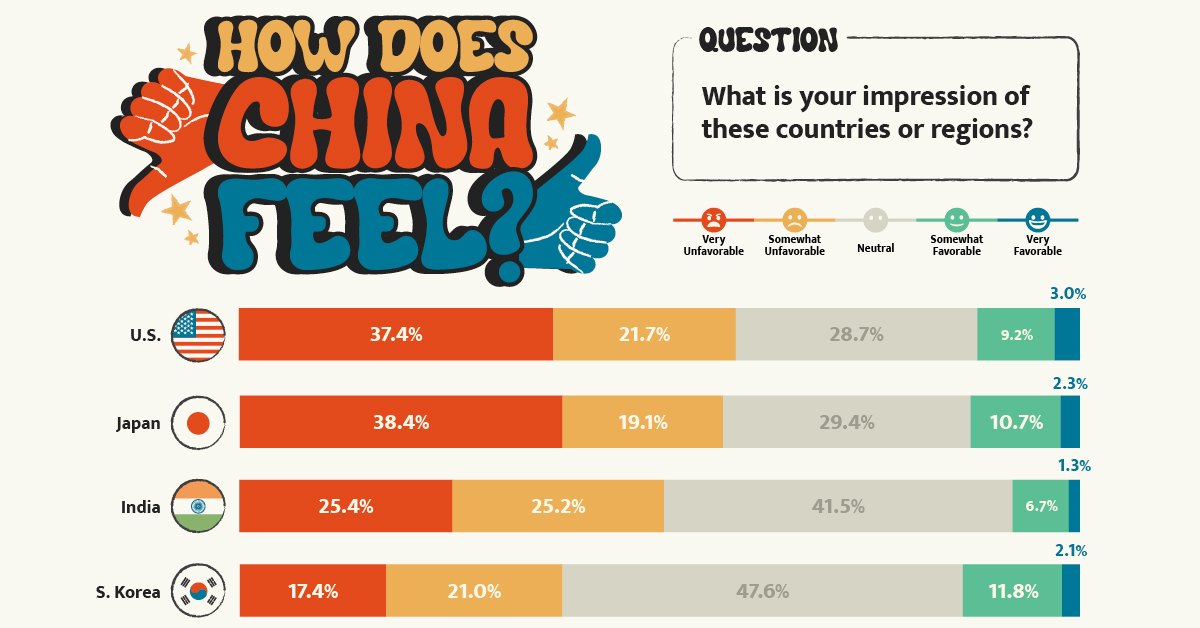
Public Opinion: How Chinese Citizens Feel About Other Countries
Tensions over Taiwan, the COVID-19 pandemic, trade, and the war in Ukraine have impacted Chinese sentiment towards other countries.
This visualization uses data from the Center for International Security and Strategy (CISS) at Tsinghua University to rank survey responses from the Chinese public on their attitudes towards countries and regions around the world.
Chinese Sentiment Towards Other Countries in 2023
In the Center’s opinion polls, which surveyed a random sample of more than 2,500 Chinese mainland adults in November 2022, Russia came out significantly ahead.
Just under 60% of respondents held Russia in a favorable view, with 19% seeing the country as “very favorable.” Contrast that to the mere 12% that viewed the U.S. in a positive light.
Here’s a closer look at the data. The percentages refer to the share of respondents that voted for said category.
| Country/Region | Very Unfavorable | Somewhat Unfavorable | Neutral | Somewhat Favorable | Very Favorable |
|---|---|---|---|---|---|
| 🇺🇸 United States | 37.4% | 21.7% | 28.7% | 9.2% | 3.0% |
| 🇯🇵 Japan | 38.4% | 19.1% | 29.4% | 10.7% | 2.3% |
| 🇮🇳 India | 25.4% | 25.2% | 41.5% | 6.7% | 1.3% |
| 🇰🇷 South Korea | 17.4% | 21.0% | 47.6% | 11.8% | 2.1% |
| 🇪🇺 European Union | 9.3% | 15.6% | 57.6% | 14.1% | 3.3% |
| Southeast Asia | 7.1% | 13.1% | 59.5% | 16.8% | 3.5% |
| 🇷🇺 Russia | 3.0% | 4.8% | 33.7% | 39.4% | 19.0% |
Japan ranked just below the U.S. in terms of overall unfavorability, though a slightly higher share of respondents saw Japan as “very unfavorable” compared to America. This is likely due to both modern tensions in the East China Sea over mutually claimed islands and historical tensions over the Sino-Japanese Wars.
Chinese sentiment towards India was also unfavorable at just over 50%, though notably the country also received the lowest favorability rating at just 8%.
Additional Survey Findings
The survey also found that 39% of Chinese people get their information on international security from Chinese state-run media (mainly through TV), with an additional 19% getting information from government websites and official social accounts. Conversely, only 1.7% get their news from foreign websites and foreign social media, partially due to the Great Firewall.
When asked about different international security issues, the biggest shares of Chinese citizens ranked the following as their top three:
- Pandemics (12.9%)
- Disputes over territory and territorial waters (12.9%)
- China-U.S. relations (12.0%)
The pandemic’s high score reflects the harsher impact COVID-19 had on China. Chinese borders were shut for years and the public faced intense measures to reduce spread.
In terms of other world events, the majority of Chinese people align with a more “Eastern” viewpoint. For example, in regards to the war in Ukraine, the report found that:
“About 80 percent of the respondents believe the U.S. and Western countries should be held most accountable [for the war], while less than ten percent of the respondents argue that Russia is mainly responsible.”– Center for International Security and Strategy, Tsinghua University
Overall, the views of the Chinese public reflect the opposite of those found in many Western countries. They provide an important insight that it is not just the Chinese government holding particular views about the world, but the Chinese public as well.
-

 United States6 days ago
United States6 days agoMapped: The Safest Cities in the U.S.
-

 Markets2 weeks ago
Markets2 weeks agoRanked: The Most Profitable U.S. Companies, by Sector
-

 Technology5 days ago
Technology5 days agoHow Long it Took for Popular Apps to Reach 100 Million Users
-
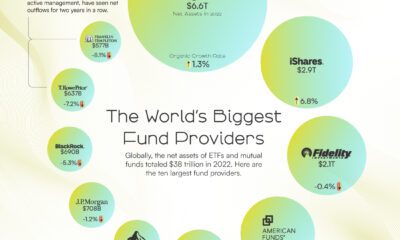
 Markets4 weeks ago
Markets4 weeks agoThe World’s Biggest Mutual Fund and ETF Providers
-

 Brands2 weeks ago
Brands2 weeks agoBrand Reputations: Ranking the Best and Worst in 2023
-

 Environment5 days ago
Environment5 days agoHotter Than Ever: 2023 Sets New Global Temperature Records
-

 Datastream4 weeks ago
Datastream4 weeks agoCan You Calculate Your Daily Carbon Footprint?
-
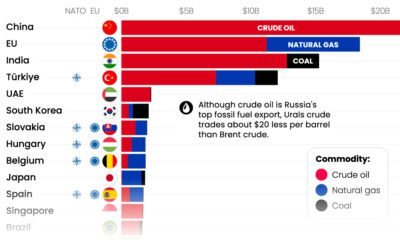
 Energy2 weeks ago
Energy2 weeks agoWho’s Still Buying Russian Fossil Fuels in 2023?

